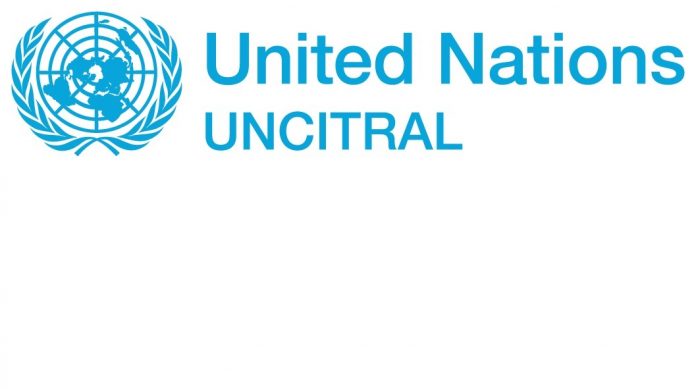This article is written by Gautam Badlani, a student at Chanakya National Law University, Patna. This article examines the object and significance of the UNCITRAL Arbitration Rules, thereby providing an overview of the Rules and analysing their application in international investment agreements.
This article has been published by Sneha Mahawar.
Table of Contents
Introduction
The United Nations Commission on International Trade Law (UNCITRAL) Arbitration Rules lay down a set of guidelines governing the arbitration procedure. These Rules have gained global acceptance and have been adopted by several national as well as international tribunals. For example, the Iran-United States Claims Tribunal followed the procedure laid down in the UNCITRAL Rules.
These Rules have played a key role in promoting arbitration in the sphere of international investment agreements and ad hoc agreements between private parties. Several international agreements vest discretion on the parties and require disputed investors to agree to the application of the UNCITRAL Rules.
This article highlights the historical development and scope of the UNCITRAL Rules. It provides a detailed overview of the UNCITRAL Rules and draws a comparison between the UNCITRAL Rules and the Arbitration and Conciliation Act, 1996.
UNCITRAL
UNCITRAL was established by the United Nations General Assembly upon realising that there were huge disparities in the domestic legislations of the different states regulating international trade and these discrepancies were an impediment to global trade. UNCITRAL aims at harmonising and facilitating international trade. It has a total of six working groups. Seventy countries are members of UNCITRAL. The members are appointed for a six-year term, and half the members retire every three years.
Historical development
The United Nations General Assembly adopted the UNCITRAL Arbitration Rules in 1976. Since then, these Rules have been modified several times to bring them at par with the contemporary developments in the field of arbitration. These Rules are framed after comprehensive discussions with the governments of various countries, along with intergovernmental discussions and deliberations with international NGOs. It is the duty of the Secretary General of the United Nations to ensure that the Rules are known and made available to interested parties and the public at large.
A primary reason behind the popularity of these Rules is their application in the Iran United States Claims Tribunal. The Tribunal which had to settle claims for billions of dollars was governed largely by the UNCITRAL Rules. However, the agreement did provide that the parties could modify the Rules for the effective settlement of the dispute.
1976 version
The 1976 version of the UNCITRAL Arbitration Rules were adopted by the United Nations General Assembly at the 31st Session. The Assembly noted that arbitration had emerged as an important method for international commercial dispute resolution and laying down the Rules governing ad hoc arbitration that are acceptable to countries with diverse and distinct social, economic and legal conditions would result in harmonising international economic relations. These Rules had been adopted by the ninth session of the United Nations Commission on International Trade Law. The 1976 Rules facilitated the resolution of private, commercial, and interstate disputes.
2010 version
These Rules were revised in the year 2010 in order to bring them at par with the contemporary arbitration requirements and to ensure that the Rules reflected the changes that had taken place between 1976 and 2010. The United Nations General Assembly recommended the use of the 2010 Rules at its sixty-fifth session. The Assembly had noted the need to modify the Rules to meet the changes that had taken place in the three decades since their enactment and believed that the 2010 version would enhance the efficiency of the Rules. The 2010 version of the Rules had been adopted by the forty-third session of the United Nations Commission on International Trade Law.
The modifications to the 1976 versions were the result of extensive deliberations with the various national governments and other concerned institutions and individuals. After the introduction of the 1976 version of the Rules, certain arbitral institutions offered to help in the administration of the Rules. Thus, it was recommended that such institutions should act as the appointing authorities. The 2010 Rules introduced provisions relating to the liability of the parties, objection to the nomination of expert witnesses, etc.
2013 version
By virtue of the 2013 version, paragraph 4 to Article 1 was introduced. It incorporated the Rules on Transparency in Treaty-based Investor-State Arbitration. The primary purpose of incorporating these Rules was to bring transparency to investor-state arbitrations, as they involve considerable public interest. These transparency-oriented Rules are aimed at ensuring good governance. It is pertinent to note that the Rules on Transparency can also be applied to arbitrations that are not covered by the Arbitration Rules.
This provided clarity with respect to transparency Rules in investor-state arbitration. However, in all other respects, the Rules remained virtually unchanged.
Rules on Transparency in Treaty-based Investor-State Arbitration
The Rules on Transparency are divided into 8 Articles and are applicable to all investor-state arbitrations that are based on a treaty and initiated under the Arbitration Rules after April 1st, 2014. However, even if the arbitration commenced prior to the specified date, the Rules on Transparency can be applied if any of the following conditions are satisfied:
- The disputing parties agree to their application.
- The parties to the concerned treaty agree to their application.
It is pertinent to note that unless the treaty itself provided for any deviation from the Rules on Transparency, the disputing parties cannot agree to any deviation by virtue of any agreement or otherwise. A treaty, for the purpose of these Rules, is any bilateral or multilateral treaty that stipulates the protection of investors or investment and that confers the right on the investors to undertake arbitration against the other parties. The expression ‘treaty’ would also include bilateral investment treaties, free trade agreements, cooperation agreements, or economic integration agreements.
The Tribunal shall, while exercising its discretion, have due regard to the interests of the public and the interests of the disputing parties in an efficient and fair dispute resolution. The Rules on Transparency supplement any other applicable arbitration Rules and also prevail over them in the event of any conflict.
The disputing parties are required to inform the repository of the arbitration, and the repository would make the information regarding the arbitration available to the public and the concerned economic sector. The repository would be either the UN Secretary-General or any other institution nominated by UNCITRAL. Documents such as arbitration notices, statements of claim and defence, further written statements, etc., would be made available in the public domain. The Tribunal can also allow the submission to be made by a third party. In deciding whether to permit the third person to make the submission or not, the Tribunal would consider the interest that such a third person has in the arbitration process and the extent to which his submission would help the Tribunal in deciding the concerning factual or legal issue.
Similarly, the Tribunal can also allow the submissions to be made by a party that is not disputed by the treaty. The hearings would be public, except where confidential information is concerned. In cases where the information is confidential, the documents or hearing would not be public in nature.
Article 7 of the Rules on Transparency provides a list of information that can be classified as confidential. It includes business information that is of a confidential nature, any information whose disclosure might restrict law enforcement, information that is protected by law, and information whose public disclosure is prohibited by virtue of the treaty itself.
2021 version
The latest version of these Rules is the 2021 version. This version of the Rules was recommended by the United Nations General Assembly at its seventy-sixth session. The Assembly had noted the disputed parties had a right to fair treatment and due process, and this right had to be balanced with the efficiency of the arbitral process. The UNCITRAL Working Group II worked extensively on the preparation of the Expedited Rules.
However, it is pertinent to note that the Expedited Rules will not be applicable to all the arbitrations that are instituted under the UNCITRAL Arbitration Rules but only to those arbitrations where the parties expressly consent to their application.
Objective of the Rules
The Rules are framed in light of the growing use of arbitration as a dispute-settling mechanism in international commercial relations. The primary purpose of these Rules is to provide the procedure to be followed for the resolution of international commercial disputes. The parties to an agreement, that stipulates arbitration as a dispute resolution mechanism, may prescribe the UNCITRAL Arbitration Rules as the Rules that would govern the arbitration proceedings.
Moreover, these Rules provide guidance to the various national governments in regard to how they can frame their domestic arbitration legislation.
Overview
These Rules are divided into four sections:
- Section 1 deals with the introductory Rules which are contained in Articles 1-6.
- Section 2 deals with the composition of the Arbitral Tribunal which is contained in Articles 7-16.
- Section 3 deals with the Arbitral proceedings. It covers Articles 17 to 32.
- Section 4 deals with the award by the Tribunal. It covers Articles 33 to 43.
Section I
Article 1 provides that the provisions of the Rules would be applicable where parties agree that any dispute between them would be subject to arbitration proceedings as provided under the UNCITRAL Arbitration Rules. The Article further provides that if the Rules are in conflict with any provision of law that is applicable to the arbitration, then in such a scenario, the legal provision would prevail over the Rules.
Article 2 provides that any notice of communication, proposal or notification has to be sent to the party’s designated address. Where no specific address has been designated, physical delivery to the assessee or the delivery at the place of his habitual residence or business would suffice. Communication can also be made via electronic means.
Article 3 provides that the party that initiates the arbitration is required to send a notice of the same to the opposite party. The notice shall contain the parties’ names and details, the identity particulars of the concerned arbitration agreement, the relief claimed, particulars about the language of arbitration, the place of arbitration, and the proposed number of arbitrators.
According to Article 4, the respondent has to communicate his response to the notice within 30 days of its receipt.
As per Article 5, the parties have the right to be represented by the persons of their choice, and they have to communicate the names and other details of such persons to the Tribunal as well as to the other interested parties.
The appointing authority may be agreed upon by mutual agreement between the parties or by the Secretary-General of the Permanent Court of Arbitration at the Hague, in case the parties fail to reach any agreement as stated in Article 6.
Section 1 under the previous versions
Under the 1976 version, there were only 4 Articles in Section 1. Articles 4 and 6 were added by virtue of the 2010 modification.
The 2013 modification added to paragraph 4 to Article 1 which provided for the application of UNCITRAL Rules on Transparency in Treaty-based Investor-State Arbitration.
Under the 2013 version, there were no provisions about the Expedited Arbitration Rules. By virtue of the 2021 modification, the UNCITRAL Expedited Arbitration Rules were added through an appendix. Apart from the addition of paragraph 5 to Article 1, the Rules remained virtually the same as in the 2013 version.
Section II
Article 7 provides that unless the parties agree to have a sole arbitrator, there will be three arbitrators.
Articles 8 to 10 deal with the appointment of arbitrators. Where the parties agree that there should be a sole arbitrator but fail to reach any agreement with respect to his appointment within 30 days of the receipt of the appointment proposal, then the appointing authority shall be empowered to appoint the sole arbitrator.
Where three arbitrators are to be appointed, one arbitrator would be appointed by each of the parties, and the two would then appoint a third arbitrator who would be the presiding authority. Where the claimant or the respondent consists of multiple parties, then in such a scenario the arbitrator from the side of the claimant or respondent, as the case may be, would be appointed jointly by all the parties.
Articles 11 to 13 deal with the disclosures that the arbitrators are mandated to make. Any person who is approached to be appointed as an arbitrator is under a duty to disclose all material facts that may give rise to doubts as to his impartiality. Moreover, the parties are also entitled to object to the appointment of any person as an arbitrator on grounds of his independence or impartiality.
The party intending to challenge the appointment of the arbitrator has to send a notice of the same within 15 days of the appointment. The notice must state the reasons for the challenge and be communicated to all parties.
The disrupted arbitrator can either withdraw his name from the list of arbitrators or the appointing authority will decide on the challenge to his appointment. The power to appoint the substitute arbitrator would be with the party whose nomination has to be substituted according to Article 14.
By virtue of Article 16, the parties are deemed to have waived their claims against the arbitrators and the appointing authority, in connection with any act or omission on the part of these authorities in regard to the arbitration procedure.
Section II under the previous versions
The 1976 versions did not contain Article 16, which deals with the exclusion of the liability of the appointing authority and the arbitrators.
No material changes were made to Section II by virtue of the 2013 and 2021 modifications.
Section III
The Tribunal has the power to make its Rules for its own procedures. The Tribunal is required to prepare a provisional timetable of arbitration.
Place and language
Articles 18 and 19 deal with the place and language of arbitration, respectively. The place of arbitration would be determined by the parties. Where the parties fail to determine the place of arbitration, the Tribunal will decide the place of arbitration.
The Arbitral Tribunal will determine the language that is to be used in the arbitration proceedings, and the decision of the tribunal will be subject to any agreement that may exist between the parties.
Statement of claim and defence
Articles 20 and 21 deal with the statement of claim and defence, respectively. The claimants will have to submit a statement of claim, and similarly, the respondents will be required to submit a statement of defence. By virtue of Article 22, the claim and defence can be amended or supplemented, provided that such amendment or supplement does not fall beyond the jurisdiction of the Tribunal and the Tribunal does not consider such supplement or amendment inappropriate. The burden of proving the evidence will be on the party that relies on such evidence.
It may be argued that in order to expedite the arbitration procedure, the requirement of submitting a separate notice of arbitration and statement of claim should be done away with, and rather a single document combining the arbitration notice and statement of claim must be served.
The statement of claim would usually contain details such as the name and other particulars of the concerned parties, the relief sought from the Tribunal, facts supporting the claim, etc. The defendants are required to file, along with the statement of defence, all the relevant documents upon which they rely in support of their case. The Tribunal will decide if any further written statements have to be filed by any of the concerned parties (Article 24).
Objection to jurisdiction
By virtue of Article 23, the Tribunal has the power to decide any objection to the jurisdiction of the Tribunal. Any dispute regarding the validity or existence of the agreement would also be decided by the Tribunal. Merely because a party has engaged in the arbitrators’ appointment will not preclude him from raising an objection to the jurisdiction of the Tribunal at a subsequent stage. Similarly, where the parties feel that the Tribunal is acting in breach of the scope of its authority, they must raise an objection at the earliest possible moment. The Tribunal can decide on such an objection either at the preliminary stage or in the final order.
Interim measures
Article 26 empowers the Tribunal to grant interim measures. An interim measure may be defined as a temporary relief that is awarded to a party at a preliminary stage before the final order. The following interim measures can be ordered by the Tribunal::
- Maintaining the status quo,,
- Preventing the commission of any act or omission that would prejudice the arbitration or would harm the arbitration process, and, and
- Ordering the preservation of material evidence.
The party pleading for the interim measure has to prove before the Tribunal that, in the absence of any interim relief, it would suffer an irreparable loss that would be of a substantially greater degree as compared to the harm that the opposite party would suffer if the interim measure is granted.
Evidence and oral hearings
Article 27 deals with the burden of proof and the relevance of evidence. The burden to prove the facts is on the party that relies on such facts. Any individual may be presented as a witness by the parties, notwithstanding whether he is a part of the arbitration process or related to any of the parties to the arbitration. The parties are also entitled to present expert witnesses before the Tribunal. The Tribunal has the authority to determine the relevance and admissibility of the evidence.
Article 28 prescribes the procedures for hearings. Tribunal will decide upon the manner in which the witnesses are to be examined. In the absence of any agreement to the contrary, in-camera proceedings would be held. The Tribunal has the discretion to order the examination of the witnesses through telecommunication means if the Tribunal believes that the physical presence of the witnesses is not necessary.
Article 29 deals with the appointment of expert witnesses. The Tribunal shall also be empowered to appoint independent experts on specific matters after consultation with the parties. The expert is required to present his qualifications to the parties as well as the Tribunal. Furthermore, he is required to submit a statement signifying his independence and impartiality. The parties are entitled to raise any objection to the independence, qualifications as well as in partiality and the Tribunal will decide on such objection.
Before closing the hearings, the Tribunal is required to ask the parties if there is any further proof or witnesses that they would like to present before the Tribunal.
Default by the parties
Article 30 contemplates a situation where the parties default in fulfilling their duties. Where the claimant fails to communicate his statement of claim, the Tribunal will terminate the arbitration process. On the other hand, if the respondent defaults in communicating either his response to the arbitration notice or the statement of defence, the Tribunal would proceed with the arbitration process. Where any party defaults in furnishing the relevant and material documents or other evidence within the prescribed period of time, the Tribunal will make an order based on the evidence present before it.
Section III under the previous versions
Under the 1976 version, it was necessary that the award should be made by the Tribunal at the place of arbitration. There was no provision which empowered the Tribunal to make a joinder of parties. Under this version, Article 26 dealt with the interim measures and it was very narrow in scope. It did not provide a clear description of the nature of interim measures that could be taken by the Tribunal. There was no mention of expert witnesses and Article 27 (the current Article 29) dealing with the experts appointed by the Tribunal did not mention any requirement to establish their independence.
The 2010 version made several additions aimed at ensuring the speedy settlement of disputes. Article 17 was modified to provide that any communication made by any party should be communicated to the other parties at the same time. Under Article 17, the Tribunal was empowered to make a joinder of parties. The 2010 version provided that the award made by the Tribunal would be deemed to have been made at the place of arbitration.
The 2010 version made it mandatory for the claimant to annex a copy of the concerned arbitration contract/agreement along with the statement of claim. With respect to the statement of defence, the Tribunal was empowered to treat the respondent’s response to the arbitration notice as the statement of defence.
The 2010 version expressly provided that any objection with regards to the Tribunal acting beyond its authority had to be raised at the outset. This version provided an inexhaustive list of interim measures that the Tribunal was empowered to take and also expressly clarified the burden that the party requesting the interim measure had to discharge. It stipulated that expert witnesses may also be examined by the Tribunal.
The 2010 version laid special emphasis on the independence of the experts appointed by the Tribunal. The experts have to submit a statement of independence before accepting the appointment, and the parties are entitled to make an objection on grounds of their impartiality.
No material changes were made to Section III by virtue of the 2013 and 2021 modifications.
Section IV
Award
Where there is more than one arbitrator, the order will be decided on the basis of the decision of the majority of the arbitrators (Article 33). Article 34 provides that the awards made by the Tribunal would be binding on the parties and that the Tribunal would make separate awards on distinct issues. The Tribunal will have to state the reasons for determining the award.
By virtue of Article 35, the Tribunal is required to apply the law that is designated by the parties. The Tribunal has to pass the order on the basis of the agreement that was entered into by the disputing parties. Where the parties enter into an agreement before the final decision is pronounced by the Tribunal, the Tribunal can either pass an order terminating the arbitration process or, at the request of the parties, pass an order recording the settlement reached between the parties (Article 36).
Interpretation and rectification of the award
Articles 37 and 38 deal with the interpretation and correction of the award, respectively. The party can make a request for the interpretation of the award passed by the Tribunal within a period of 30 days from the order’s receipt. Moreover, within 30 days of the passing of the award, the party can request the Tribunal to rectify any clerical, typographical, or computation error that might have occurred in the order. The Tribunal has to make the correction within 45 days of the request.
Costs and expenses of arbitrators
Articles 40 to 42 deal with the cost of arbitration. In principle, the cost of arbitration will have to be borne by the party that loses. However, the Tribunal has the discretion to apportion the costs among the parties as it deems fit. The cost of arbitration would be fixed by the Tribunal in the award itself and would include the fees of the arbitrators as well as the independent expert, if appointed. The Tribunal is required to inform the parties about the manner in which the expenses and the fees of the arbitrators have been ascertained. The parties have the authority to raise an objection to such fees or expenses within 15 days of receiving information about the amount determined by the Tribunal. In the absence of any appointing authority, the Secretary-General will have the authority to decide on such an objection.
Section IV under the previous versions
The 1976 version provided that if the domestic arbitration law of any country provided that the award should be registered by the Tribunal, then the same should be complied with by the Tribunal within the prescribed time period. This requirement was removed under the 2010 version and this version stipulated that the award could be made public if
- All the parties consent or,
- To the extent, a party is legally obliged to disclose the award or has to disclose it to claim a legal right.
By virtue of the 2010 modification, the provisions with regard to the calculation of arbitrators’ fees and expenses were also made more exhaustive. The Tribunal was mandated to inform the parties of the manner in which the fees and expenses were determined, and the parties were empowered to object to the amount determined by the Tribunal.
No material changes were made to Section III by virtue of the 2013 and 2021 modifications.
Expedited Arbitration Rules
Article 1 of the UNCITRAL Arbitration Rules provided that the parties may, by mutual consent, agree to the application of the Expedited Rules. The Expedited Rules are contained as an Appendix to the Act and are divided into 16 Sections.
The Expedited Rules would be applicable only where the parties agree that the arbitration be referred to such Rules. Moreover, at any stage of the proceedings, the parties may agree that the application of the Expedited Rules should be discontinued. The Arbitral Tribunal can also decide, for reasons to be recorded, upon the request of any party, that the application of the Expedited Rules should be discontinued.
The claimant is required to communicate to the respondent the statement of claim along with the notice of arbitration. The respondent has to communicate his response to the arbitration notice to the claimant within 15 days of the notice’s receipt. In the absence of any agreement to the contrary, there would be a sole arbitrator who would decide the award and who would be appointed jointly by the parties.
In order to facilitate expedited proceedings, the Tribunal would be empowered to do away with the hearings, provided there is no request by the parties to hold hearings. The Tribunal would also have the discretion to determine whether a written statement is required or not. The parties can amend or supplement their statements, claims, or defences only after obtaining the approval of the Tribunal. The award has to be made within 6 months of the Tribunal’s constitution.
Fast track procedure under Arbitration and Conciliation Act,1996
The 2021 version of the UNCITRAL Rules provides for a fast-track procedure. The Indian law also stipulates a fast-track procedure in order to ensure speedy and quick settlement of disputes.
The Arbitration and Conciliation Act, 1996 (hereinafter ‘the Act’) itself provides a fast-track procedure for arbitration proceedings. The fast-track procedure is provided under Section 29B.
The parties to the arbitration agreement may decide, in writing, to adopt the fastrack procedure to govern the arbitration proceedings. The parties will also have the discretion to decide on the appointment of a sole arbitrator.
Under this procedure, the Tribunal will have the power to decide the dispute based on the written submissions of the parties. Only where the Tribunal finds it necessary to conduct an oral hearing will it hold oral hearings for the purpose of clarifying certain issues. The Tribunal will also have the power to dispense with any technical procedures in order to ensure a speedy and expeditious resolution of the dispute. The Tribunal is under a duty to make an award within 6 months of the initiation of the arbitration proceedings.
UNCITRAL Rules and ad hoc arbitration in India
There are certain similarities between the UNCITRAL Rules and the Indian Arbitration Act. For example, Section 19 of the Act provides that the Tribunal will have the power to frame its own Rules with respect to the admissibility and relevance of the evidence, which is similar to Article 27 of the UNCITRAL Rules. Similarly, Section 22 provides that the language of the arbitration proceedings shall be determined mutually by the parties and, where the parties fail, by the Tribunal. This is similar to Article 19 of the UNCITRAL Rules.
UNCITRAL Rules have increasingly been used in Indian ad hoc agreements. The domestic legislation governing these ad hoc agreements is the Arbitration and Conciliation Act, 1996. However, the Act does not provide details and in-depth guidelines on the procedural particulars of the arbitration.
Ad hoc arbitrations are dependent on the relationship between the parties, which is usually strained, as evidenced by the parties’ recourse to arbitration to settle their dispute. Thus, clear guidelines are required to govern ad hoc arbitrations, particularly where the arbitration contracts are not drafted to deal with all the procedural requirements. The Arbitration Act fails on many fronts in this regard. It does not provide the particulars that the statement of claim and defence must contain. The Act does not contemplate a situation where the Tribunal requires the parties to submit additional written statements besides the statement of claim and defence. Another drawback of the Act is that it fails to fix a timeline for certain procedural requirements, such as the filing of the statement of claim and defence.
On the other hand, the UNCITRAL Rules, by virtue of Article 20, clearly provide an inexhaustive list of the particulars that the statement by the claimant must contain. Article 24 of the Rules specifically deals with further written statements.
Resultantly, we see that many arbitration agreements concerning ad hoc arbitration provide for the incorporation of the UNCITRAL Rules. These Rules have promoted ad hoc arbitration in India.
International investment arbitration and UNCITRAL Arbitration Rules
The UNCITRAL Arbitration Rules have been predominantly used in international investment arbitration. These Rules can be applied in international arbitration in the following ways:
- Through an arbitration clause in the investment agreement.
- By providing for the application of the Rules in an ad hoc agreement.
Moreover, these Rules would also be applicable where the domestic legislation of the States receiving the foreign capital provides for the application of UNCITRAL Rules in arbitration. Certain international trade agreements also confer the right on the disputing investor to submit the claim for arbitration to the Arbitration Rules. For example, Article 1120 of the North American Free Trade Agreement confers the right on the investor to make the UNCITRAL Arbitration Rules applicable to the arbitration.
In certain cases, the bilateral investment treaties also provide for the application of the UNCITRAL Arbitration Rules. For example in the case of AWG Group Ltd. v. The Argentine Republic (2006), the relevant bilateral investment treaty between Argentina and the United Kingdom provided that in case any investment dispute, subject to international arbitration, arose, then Argentina and the disputed investor may agree to UNCITRAL Rules or International Centre for Settlement of Investment Disputes Rules. In case the parties failed to reach an agreement on the Rules to which the dispute should be referred, the UNCITRAL Rules would be applicable.
Conclusion
It is evident that the importance and significance of the UNCITRAL Arbitration Rules in international commercial agreements have increased substantially in the past few years. These Rules have been modified from time to time in order to ensure that they meet the contemporary needs of society.
These Rules are used primarily in international investment agreements and ad hoc agreements. These Rules have been the primary guiding force behind the domestic arbitration legislation of many nations. These Rules are regarded as the standard arbitration procedure guidelines. These Rules are given preference in bilateral investment agreements as well as international trade agreements.
However, it is evident that UNCITRAL Rules do not deal with the manner in which the awards are to be executed. They do not expressly provide for the liabilities of the parties that fail to execute the award. The Rules must be updated to fill the grey area that is left with respect to the execution of the awards. Certain general guidelines can be provided with respect to the execution of the awards. Providing specific execution procedures involves the risk of conflict with the procedure prescribed by domestic legislation.
Frequently Asked Questions (FAQs)
What are ad hoc arbitration agreements?
Ad hoc arbitration agreements are those that are not institutionally administered. The parties do not designate any institution to govern the arbitration, and procedural particulars such as the place of arbitration, the language of arbitration, number and procedure of appointment of arbitrators are determined by the parties themselves.
What is the difference between UNCITRAL Arbitration Rules and the ICC Rules?
The disputes that are submitted to the International Court of Arbitration are governed by the ICC Rules of Arbitration.
The ICC Rules are concerned with institutional arbitration, while the UNCITRAL Rules deal primarily with ad hoc arbitrations. By virtue of Article 13 of the ICC Rules, the Court’s approval is required for the appointment of the arbitrators. However, under the UNCITRAL Rules, the parties have the right to choose their own arbitrators. The ICC Rules provide that the arbitrators must be independent of the parties, while the UNCITRAL Rules do not prescribe any such condition. However, under the UNCITRAL Rules, the parties are free to object to the appointment of the arbitrators on the grounds of their impartiality and independence.
With respect to the fees of the arbitrators and the administrative costs, the ICC Rules prescribe the same through published tables, while the UNCITRAL Rules leave it at the discretion of the Tribunal.
There are significant similarities between the two Rules as well. For example, both confer wide discretion on the arbitration tribunal to frame the Rules governing their proceedings
What is the difference between institutional arbitration and ad hoc arbitration?
There are the following differences between institutional arbitration and ad hoc arbitration:
- In institutional arbitrations, the administrative and supervisory duties are performed by professionals. In the ad hoc, these duties are performed by the Tribunal itself.
- There is a level of certainty when it comes to institutional arbitration as the institutions are empowered to appoint the arbitrators and perform other similar duties if the parties default on their part. However, in the case of ad hoc arbitrations, the failure of the parties to nominate the arbitrators often leads to undue delays.
- In the case of institutional arbitrations, usually, there are predetermined standards to determine the cost of arbitration proceedings. Resultantly the parties have an idea of the estimated costs even before they opt for arbitration. However, in the case of ad hoc arbitrations, the cost, as well as expenses, are determined by the Tribunal itself.
- The arbitrators engaged in institutional arbitration have significant knowledge of the arbitration procedures and possess the requisite experience. In ad hoc arbitrations, parties appoint the arbitrators whom they perceive to have the requisite experience and knowledge.
References
- https://www.scconline.com/blog/post/2021/10/30/exploring-the-use-of-uncitrals-arbitration-Rules-and-materials-in-indian-ad-hoc-arbitrations/
- https://scholar.smu.edu/cgi/viewcontent.cgi?article=2631&context=til
- https://papers.ssrn.com/sol3/papers.cfm?abstract_id=3951174
Students of Lawsikho courses regularly produce writing assignments and work on practical exercises as a part of their coursework and develop themselves in real-life practical skills.
LawSikho has created a telegram group for exchanging legal knowledge, referrals, and various opportunities. You can click on this link and join:
Follow us on Instagram and subscribe to our YouTube channel for more amazing legal content.
 Serato DJ Crack 2025Serato DJ PRO Crack
Serato DJ Crack 2025Serato DJ PRO Crack














 Allow notifications
Allow notifications


